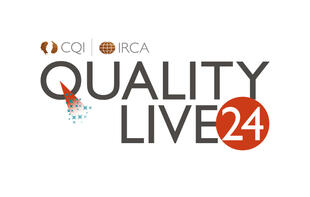
How the global test, inspection, and certification (TIC) sector is responding to AI

Our Chief Executive, Vince Desmond, shares his key takeaways from the UKAS-sponsored summit on AI in March. Insights include AI regulation, data as a strategic asset, and the critical role quality experts can play through collaboration with data and AI science professionals.
When the leaders of the major global certification bodies, the secretary general of ISO, Google, and global AI leaders take the time to meet physically in person, you get a feeling that something big is up. In March, UKAS sponsored an Artificial Intelligence (AI) Summit for the global test, inspection, and certification (TIC) sector. Here are my four key takeaways.
1. AI regulation
Experts in AI regulation — particularly the new EU AI act — made the point that regulators simply will not keep up with the pace of innovation. How different areas of the world interpret principles, such as trust and ethics, within varying regulatory approaches and political mindsets poses further challenges. This limits any prospect of harmonized global regulation.
You may recall that at last year’s AI summit in Bletchley Park the big technology organisations were keen on AI regulation. Cynics argue big organisations only want regulation to make it difficult for smaller players to access the market. This might be true, as maybe how most organisations will be ethical in their approach to AI. Regardless, the major threat will come from AI actors operating outside regulation, like ‘Fraud GPT’.
Trust in AI will be an increasing concern for society. In 2023, the UK Office for National Statistics found that people’s views on the impact of AI were reasonably evenly split between negative, positive, and neutral.
Ultimately, this is about product safety, security, and ethics, and it is interesting to see the UK Law Society pushing for regulation requiring organisations of a certain size and nature to have an AI Officer.
Vince Desmond, CEO, CQI
2. Voluntary standards and accredited certification
Voluntary standards were rightly pitched as the solution in terms of speed and impact, and emergent regulation in the UK, USA, and EU recognises the role of the TIC sector.
It was encouraging to see the debate recognise society must take a collaborative systems approach to AI with regulators, standards makers, the TIC industry, professional bodies, investors, and insurers. We have recently seen the potential future of legal liability with the Air Canada chatbot court case. Unsuccessfully, the airline argued that its customer service AI — which gave wrong advice to a customer — was a separate legal entity responsible for its own actions.
It was recognized that the current time it takes to develop standards must be faster. There is progress in this area with things like BSI’s accelerated standards development approach. We are not at the stage of AI generating standards, but this will be a possibility.
Of course, the new ISO 42001 standard for AI management systems was mentioned and underlined the issue with speed of innovation. Accreditation bodies are running pilots while the supporting assets for the topic, such as competence requirements for assessing AI, are still being developed. TIC leaders admitted they are not entirely sure how to test AI for certification purposes. For example, how is AI tested when its outputs potentially change with every new datum? And what do concepts such ‘fairness’ mean between sectors? Promisingly the German TÜVs have collectively set up an AI laboratory.
Further exploration revealed how TIC bodies use digital technologies to provide value to their customers. LRQA talks about Assurance 4.0, and we learned of TIC bodies using AI to generate assessment outputs and to use data to help predict performance and risk in the customers and sectors they serve. We are not at the stage of AI certifying AI, but this is undoubtedly possible.
3. Data as a strategic asset
Data is a strategic asset and critical component to AI. Yet, surprisingly, there was little mention of data quality, data governance, and data security during the summit — although the UK National Physical Laboratory is progressing in this area.
4. Knowledge deficits and professional domains
The skills deficit was noted by all attendees. AI experts at the summit recognised their community has limited competence in compliance, regulation, standards, assurance, and testing. While the TIC and standards leaders acknowledged the need to invest in AI expertise. There is a clear role for professional bodies here to educate, learn, and collaborate.
A future built on trust
Three years ago, the CQI and IRCA posed two questions for the quality management community:
- How will we help society gain value from but also mitigate risks of digital technology?
- How will we apply digital technologies to the management of quality governance, assurance, and improvement?
While speaking at UKAS’s annual conference during this time, I was asked what I thought the major opportunity for accredited certification would be. My answer was ‘trust’ given the potential for the digital and sustainability markets to become chaotic, undisciplined, and ungovernable.
Encouragingly, the AI summit demonstrated the global TIC sector has these questions and the concept of trust firmly in its sights, while recognising the challenges facing it.
Perhaps the most important takeaway for the quality profession is the need to develop digital knowledge and to educate, support, and collaborate with data and AI science professionals.
Vince Desmond, CEO, CQI
We must play a critical role with our expertise and knowledge of quality control and assurance, systems thinking, compliance, and standards to support other professional domains.
Following the summit, the TIC Council released their latest white paper — ‘Trustworthiness of Artificial Intelligence’ — highlighting the crucial role of the TIC industry in building trust within the AI landscape. For now, keep an eye on this space as the TIC Council is set to announce a ‘global AI compact’ in London in May.
Join the CQI conversation on AI throughout 2024 at Quality Live in June and World Quality Week in November.

